- Home
- J. D. Robb
Survivor in Death
Survivor in Death Read online
Contents
PROLOGUE
1
2
3
4
5
6
7
8
9
10
11
12
13
14
15
16
17
18
19
20
21
22
23
This is a work of fiction. Names, characters, places, and incidents are either the product of the author’s imagination or are used fictitiously, and any resemblance to actual persons, living or dead, business establishments, events or locales is entirely coincidental.
Survivor in Death
A Putnam Book / published by arrangement with the author
All rights reserved.
Copyright © 2005 by Nora Roberts
This book may not be reproduced in whole or part, by mimeograph or any other means, without permission. Making or distributing electronic copies of this book constitutes copyright infringement and could subject the infringer to criminal and civil liability.
For information address:
The Berkley Publishing Group, a division of Penguin Putnam Inc.,
375 Hudson Street, New York, New York 10014.
The Penguin Putnam Inc. World Wide Web site address is
http://www.penguinputnam.com
ISBN: 978-1-1012-0500-6
A PUTNAM BOOK®
Putnam Books first published by The Putnam Publishing Group, a member of Penguin Putnam Inc.,
375 Hudson Street, New York, New York 10014.
PUTNAM and the “P” design are trademarks belonging to Penguin Putnam Inc.
Electronic edition: February, 2005
TITLES BY J. D. ROBB
Naked in Death
Glory in Death
Immortal in Death
Rapture in Death
Ceremony in Death
Vengeance in Death
Holiday in Death
Conspiracy in Death
Loyalty in Death
Witness in Death
Judgment in Death
Betrayal in Death
Seduction in Death
Reunion in Death
Purity in Death
Portrait in Death
Imitation in Death
Divided in Death
Visions in Death
TITLES BY NORA ROBERTS
Honest Illusions
Private Scandals
Hidden Riches
True Betrayals
Montana Sky
Born in Fire
Born in Ice
Born in Shame
Daring to Dream
Holding the Dream
Finding the Dream
Sanctuary
Homeport
Sea Swept
Rising Tides
Inner Harbor
The Reef
River’s End
Carolina Moon
Jewels of the Sun
Tears of the Moon
Heart of the Sea
The Villa
From the Heart
Midnight Bayou
Dance upon the Air
Heaven and Earth
Face the Fire
Three Fates
Chesapeake Blue
Birthright
Key of Light
Key of Knowledge
Key of Valor
Northern Lights
Blue Dahlia
BY NORA ROBERTS AND J. D. ROBB
Remember When
So shalt thou feed on Death, that feeds on men, And Death once dead, there’s no more dying then.
—WILLIAM SHAKESPEARE
Happy families are all alike; every unhappy family is unhappy in its own way.
—LEO NIKOLAEVICH TOLSTOI
PROLOGUE
A LATE-NIGHT URGE FOR AN ORANGE FIZZY SAVED NIXIE’S life. When she woke, she could see by the luminous dial of the jelly-roll wrist unit she was never without that it was after two in the morning.
She wasn’t allowed to snack between meals, except for items on her mother’s approved list. And two in the morning was way between.
But she was dying for an Orange Fizzy.
She rolled over and whispered to her best friend in the entire galaxy, Linnie Dyson. They were having a school-night sleepover because Linnie’s mom and dad were celebrating their anniversary in some fancy hotel.
So they could have sex. Mom and Mrs. Dyson said it was so they could have a fancy dinner and go dancing and crap-o, but it was for sex. Jee-zus, she and Linnie were nine, not two. They knew what was what-o.
Besides, like they gave a woo. The whole deal meant Mom—the Rule Monster—bent the rules about school nights. Even if they’d had to turn the lights out at nine-thirty—were they two?—she and Linnie had the most magolicious time.
And school was still hours away, and she was thirsty. So she poked Linnie and whispered again.
“Wake up!”
“Nuh. Not morning. Still dark.”
“It is morning. It’s two in the morning.” That’s why it was so frosty. “I want an Orange Fizzy. Let’s go down and get one. We can split it.”
Linnie only made grunting, mumbling noises, rolled away, and tugged the covers nearly over her head.
“Well, I’m going,” Nixie said in the same hissy whisper.
It wasn’t as much fun on her own, but she’d never get back to sleep now, thinking of the Fizzy. She had to go all the way down to the kitchen because her mother wouldn’t allow her to have an AutoChef in her room. Might as well be in prison, Nixie thought, as she scooted out of bed. Might as well be in prison in 1950 or something instead of her own house in 2059.
Mom had even put child codes on all the household AutoChefs so the only thing Nixie or her brother, Coyle, could program was health sludge.
Might as well eat mud.
Her father said, “Rules is rules.” He liked to say that a lot. But sometimes he’d wink at her or Coyle when their mother was out and order up some ice cream or potato crispies.
Nixie sort of thought her mom knew and pretended she didn’t.
She tiptoed out of her room, a pretty little girl, just going gangly, with a wavy mass of platinum blonde hair. Her eyes, a pale, pale blue, were already adjusted to the dark.
Still, her parents always kept a low light on in the bathroom at the end of the hall, in case anybody had to get up and pee or whatever.
She held her breath as she walked by her brother’s room. If he woke, he might tell. He could be a complete butt-pain. Then again, sometimes he could be pretty chilly. For a moment, she hesitated, considered sneaking in, waking him, and talking him into keeping her company for the adventure.
Nah. It was sort of juicy to be creeping around the house by herself. She held her breath again as she eased by her parents’ room, hoping she could stay—for once—under her mother’s radar.
Nothing and no one stirred as she crept down the stairs.
But even when she got downstairs, she was mouse quiet. She still had to get by Inga, their housekeeper, who had rooms right off the kitchen. Right off the target. Inga was mostly okay, but she’d never let her get away with an Orange Fizzy in the middle of the night.
Rules is rules.
So she didn’t turn on any lights, and snuck through the rooms, into the big kitchen like a thief. It only added to the thrill. No Orange Fizzy would ever taste as frigid as this one, she thought.
She eased open the refrigerator. It occurred to her, suddenly, that maybe her mother counted stuff like this. Maybe she kept a kind of tally of soft drinks and snack food.
But she w
as past the point of no return. If she had to pay a price for the prize, she’d worry about paying it later.
With the goal in hand, she shuffled to the far end of the kitchen where she could keep an eye on the door to Inga’s rooms and duck behind the island counter if she had to.
In the shadows, she broke the seal on the tube, took the first forbidden sip.
It pleased her so much, she slipped onto the bench in what her mother called the breakfast area, and prepared to enjoy every drop.
She was just settling in when she heard a noise and dived down to lie on the bench. From beneath it, she saw a movement and thought: Busted!
But the shadow slipped along the far counter, to the door of Inga’s room, and inside.
A man. Nixie had to slap a hand on her mouth to stifle a giggle. Inga had a boogie buddy! And she was so old—had to be at least forty. It looked like Mr. and Mrs. Dyson weren’t the only ones having sex tonight.
Unable to resist, she left the Orange Fizzy on the bench and slid out. She just had to look, just had to see. So she crept over to the open door, eased inside Inga’s little parlor, and toward the open bedroom door. She squatted down on all fours, poked her head in the opening.
Wait until she told Linnie! Linnie would be so jealous.
With her hand over her mouth again, her eyes bright with laughter, Nixie scooted, angled her head.
And saw the man slit Inga’s throat.
She saw the blood, a wild gush of it. Heard a horrible, gurgling grunt. Eyes glazed now, she reared back, her breath hissing and hitching into her palm. Unable to move, she sat, her back pressed to the wall and her heart booming inside her chest.
He came out, walked right by her, and out the open door.
Tears spilled out of her eyes, down her spread fingers. Every part of her shook as she crawled over, using a chair as a shield, and reached up to the table for Inga’s pocket ’link.
She hissed for emergency.
“He’s killed her, he’s killed her. You have to come.” She whispered the words, ignoring the questions the voice recited. “Right now. Come right now.” And gave the address.
She left the ’link on the floor, continued to crawl until she’d reached the narrow steps that led from Inga’s parlor to the second level.
She wanted her mommy.
She didn’t run, didn’t dare. She didn’t stand. Her legs felt funny, empty, like the bones in them had melted. She started to belly crawl across the hall, sobs stuck in her throat. And to her horror, she saw the shadow—two shadows now. One went into her room, the other into Coyle’s.
She was whimpering when she dragged her body through her parents’ bedroom doorway. She heard a sound, a kind of thump, and pressed her face into the carpet while her stomach heaved.
She saw the shadows pass the doorway, saw them. Heard them. Though they moved as if that’s what they were. Only shadows.
Shuddering, she continued to crawl, past her mother’s bedroom chair, past the little table with its colorful lamp. And her hand slid through something warm, something wet.
Pulling herself up, she stared at the bed. At her mother, at her father. At the blood that coated them.
1
MURDER WAS ALWAYS AN INSULT, AND HAD been since the first human hand had smashed a stone into the first human skull. But the murder, bloody and brutal, of an entire family in their own home, in their own beds, was a different form of evil.
Eve Dallas, NYPSD Homicide, pondered it as she stood studying Inga Snood, forty-two-year-old female. Domestic, divorced. Dead.
Blood spatter and the scene itself told her how it must have been. Snood’s killer had walked in the door, crossed to the bed, yanked Snood’s head up—probably by the mid-length blonde hair, raked the edge of the blade neatly—left to right—across her throat, severing the jugular.
Relatively tidy, certainly quick. Probably quiet. It was unlikely the victim had the time to comprehend what was happening. No defensive wounds, no other trauma, no signs of struggle. Just blood and the dead.
Eve had beaten both her partner and Crime Scene to the house. The nine-one-one had gone to Emergency, relayed to a black-and-white on neighborhood patrol. The uniforms had called in the homicides, and she’d gotten the tag just before three in the morning.
She still had the rest of the dead, the rest of the scenes, to study. She stepped back out, glanced at the uniform on post in the kitchen.
“Keep this scene secure.”
“Yes, sir, Lieutenant.”
She moved through the kitchen out into a bisected space—living on one side, dining on the other. Upper-middle income, single-family residence. Nice, Upper West Side neighborhood. Decent security, which hadn’t done the Swishers or their domestic a damn bit of good.
Good furniture—tasteful, she supposed. Everything neat and clean and in what appeared to be its place. No burglary, not with plenty of easily transported electronics.
She went upstairs, came to the parents’ room first. Keelie and Grant Swisher, ages thirty-eight and forty, respectively. As with their housekeeper, there was no sign of struggle. Just two people who’d been asleep in their own bed and were now dead.
She gave the room a quick glance, saw a pricey man’s wrist unit on a dresser, a pair of woman’s gold earrings on another.
No, not burglary.
She stepped back out just as her partner, Detective Delia Peabody, came up the steps. Limping—just a little.
Had she put Peabody back on active too soon? Eve wondered. Her partner had taken a serious beating only three weeks before after being ambushed steps outside her own apartment building. And Eve still had the image of the stalwart Peabody bruised, broken, unconscious in a hospital bed.
Best to put the image, and the guilt, aside. Best to remember how she herself hated being on medical, and that work was sometimes better than forced rest.
“Five dead? Home invasion?” Huffing a bit, Peabody gestured down the steps. “The uniform on the door gave me a quick run.”
“It looks like, but we don’t call it yet. Domestic’s downstairs, rooms off the kitchen. Got it in bed, throat slit. Owners in there. Same pattern. Two kids, girl and boy, in the other rooms on this level.”
“Kids? Jesus.”
“First on scene indicated this was the boy.” Eve moved to the next door, called for the lights.
“Records ID twelve-year-old Coyle Swisher.” There were framed sports posters on his walls. Baseball taking the lead. Some of his blood had spewed onto the torso of the Yankees current hot left fielder.
Though there was the debris of an adolescent on the floor, on the desk and dresser, she saw no sign Coyle had had any more warning than his parents.
Peabody pressed her lips together, cleared her throat. “Quick, efficient,” she said in flat tones.
“No forced entry. No alarms tripped. Either the Swishers neglected to set them—and I wouldn’t bet on that—or somebody had their codes or a good jammer. Girl should be down here.”
“Okay.” Peabody squared her shoulders. “It’s harder when it’s kids.”
“It’s supposed to be.” Eve stepped to the next room, called for lights, and studied the fluffy pink and white bed, the little girl with her blonde hair matted with blood. “Nine-year-old Nixie Swisher, according to the records.”
“Practically a baby.”
“Yeah.” Eve scanned the room, and her head cocked. “What do you see, Peabody?”
“Some poor kid who’ll never get the chance to grow up.”
“Two pair of shoes over there.”
“Kids, especially upper income, swim in shoes.”
“Two of those backpack deals kids haul their stuff in. You seal up yet?”
“No, I was just—”
“I have.” Eve walked into the crime scene, reached down with a sealed hand, and picked up the shoes. “Different sizes. Go get the first on scene.”
With the shoes still in her hand, Eve turned back to the bed, to the child, as Peabody
hurried out. Then she set them aside, took an Identipad out of her field kit.
Yes, it was harder when it was a child. It was hard to take such a small hand in yours. Such a small, lifeless hand, to look down at the young who’d been robbed of so many years, and all the joys, all the pains that went in them.
She pressed the fingers to the pad, waited for the readout.
“Officer Grimes, Lieutenant,” Peabody said from the doorway. “First on scene.”
“Who called this in, Grimes?” Eve asked without turning around.
“Sir, unidentified female.”
“And where is this unidentified female?”
“I . . . Lieutenant, I assumed it was one of the vics.”
She glanced back now, and Grimes saw the tall, lean woman in mannish trousers, a battered leather jacket. The cool brown eyes, flat cop’s eyes, in a sharply featured face. Her hair was brown, like her eyes, short, choppy rather than sleek.
She had a rep, and when that icy gaze pinned him, he knew she’d earned it.
“So our nine-one-one calls in murder, then hops into bed so she can get her throat slashed?”
“Ah . . .” He was a beat cop, with two years under his belt. He wasn’t ranking Homicide. “The kid here might’ve called it, Lieutenant, then tried to hide in bed.”
“How long you had a badge, Grimes?”
“Two years—in January. Lieutenant.”
“I know civilians who’ve got a better sense of crime scene than you. Fifth victim, identified as Linnie Dyson, age nine, who is not a fucking resident of this fucking address. Who is not one Nixie Swisher. Peabody, start a search of the residence. We’re looking for another nine-year-old girl, living or dead. Grimes, you idiot, call in an Amber Alert. She may have been the reason for this. Possible abduction. Move!”
Peabody snagged a can of Seal-It out of her own kit, hurriedly sprayed her shoes and hands.
“She could be hiding. If the kid called it in, Dallas, she could be hiding. She could be afraid to come out, or she’s in shock. She could be alive.”
“Start downstairs.” Eve dropped on her hands and knees to look under the bed. “Find out what unit, what ’link placed the nine-one-one.”

 Concealed in Death
Concealed in Death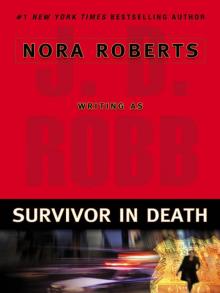 Survivor in Death
Survivor in Death Born in Death
Born in Death Ceremony in Death
Ceremony in Death Indulgence in Death
Indulgence in Death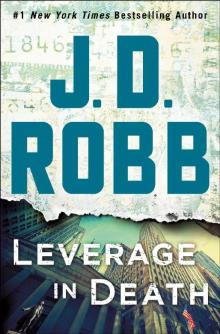 Leverage in Death
Leverage in Death Devoted in Death
Devoted in Death Conspiracy in Death
Conspiracy in Death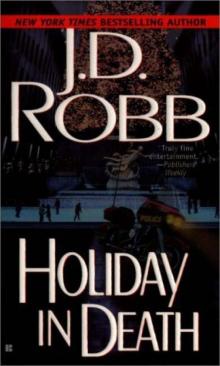 Holiday in Death
Holiday in Death The Unquiet
The Unquiet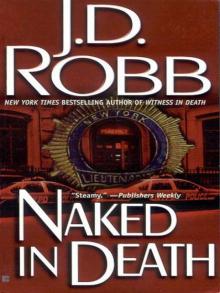 Naked in Death
Naked in Death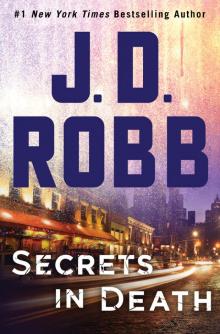 Secrets in Death
Secrets in Death Seduction in Death
Seduction in Death Strangers in Death
Strangers in Death Creation in Death
Creation in Death Dark in Death
Dark in Death Possession in Death
Possession in Death Visions in Death
Visions in Death Midnight in Death
Midnight in Death Innocent in Death
Innocent in Death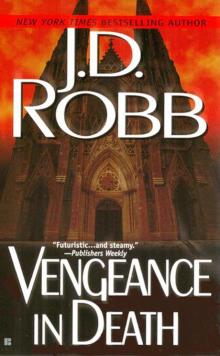 Vengeance in Death
Vengeance in Death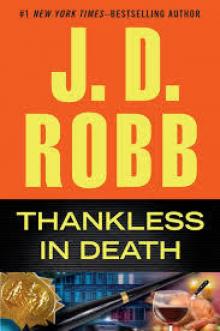 Thankless in Death
Thankless in Death Glory in Death
Glory in Death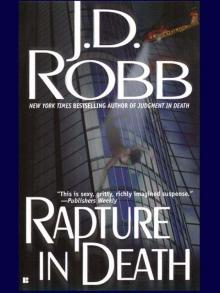 Rapture in Death
Rapture in Death Echoes in Death
Echoes in Death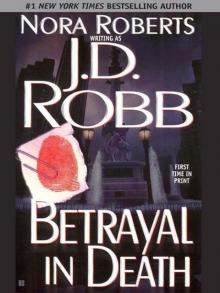 Betrayal in Death
Betrayal in Death Celebrity in Death
Celebrity in Death Immortal in Death
Immortal in Death Judgment in Death
Judgment in Death Ritual in Death
Ritual in Death Portrait in Death
Portrait in Death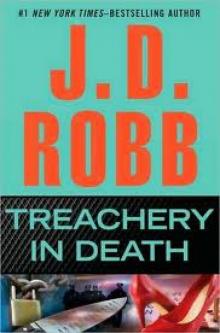 Treachery in Death
Treachery in Death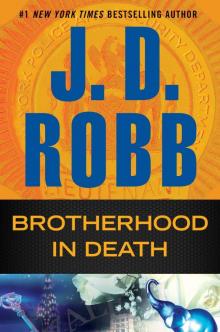 Brotherhood in Death
Brotherhood in Death Reunion in Death
Reunion in Death Connections in Death: An Eve Dallas Novel
Connections in Death: An Eve Dallas Novel Imitation in Death
Imitation in Death New York to Dallas
New York to Dallas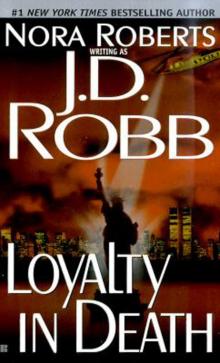 Loyalty in Death
Loyalty in Death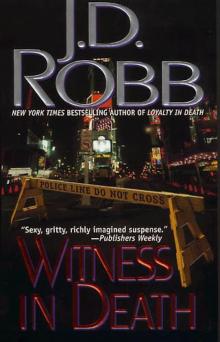 Witness in Death
Witness in Death Connections in Death
Connections in Death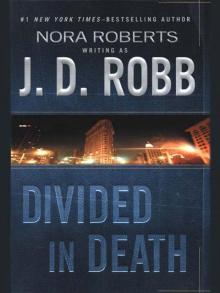 Divided in Death
Divided in Death Obsession in Death
Obsession in Death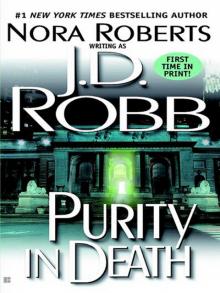 Purity in Death
Purity in Death Festive in Death
Festive in Death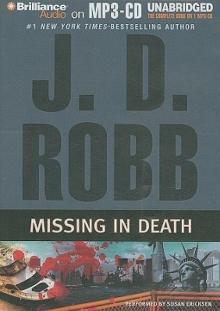 Missing in Death
Missing in Death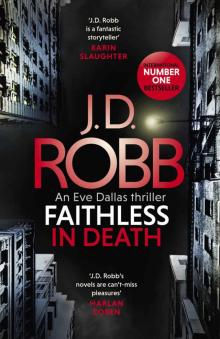 Faithless in Death: An Eve Dallas Thriller (Book 52)
Faithless in Death: An Eve Dallas Thriller (Book 52) Golden in Death
Golden in Death The In Death Christmas Collection
The In Death Christmas Collection Forgotten in Death
Forgotten in Death Calculated in Death
Calculated in Death Salvation in Death
Salvation in Death Interlude in Death
Interlude in Death Haunted in Death
Haunted in Death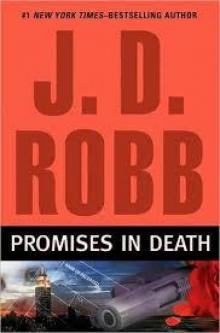 Promises in Death
Promises in Death In Death 07.5 - Midnight in Death
In Death 07.5 - Midnight in Death 44 Delusion in Death
44 Delusion in Death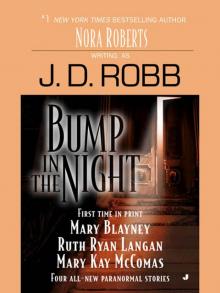 Bump in the Night
Bump in the Night The In Death Collection, Books 16-20
The In Death Collection, Books 16-20![[In Death 17] - Imitation in Death Read online](http://i1.bookreadfree.com/i/03/20/in_death_17_-_imitation_in_death_preview.jpg) [In Death 17] - Imitation in Death
[In Death 17] - Imitation in Death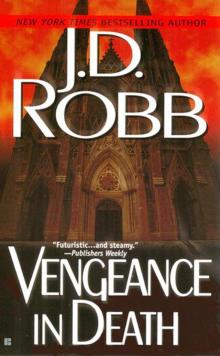 In Death 06 - Vengeance in Death
In Death 06 - Vengeance in Death Dead Of Night
Dead Of Night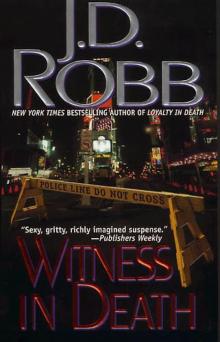 In Death 10 - Witness in Death
In Death 10 - Witness in Death![[In Death 16] - Portrait in Death Read online](http://i1.bookreadfree.com/i1/03/27/in_death_16_-_portrait_in_death_preview.jpg) [In Death 16] - Portrait in Death
[In Death 16] - Portrait in Death Possession in Death edahr-39
Possession in Death edahr-39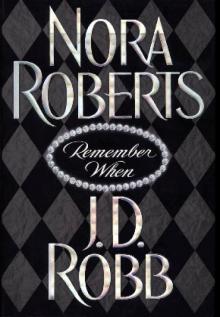 Remember When edahr-20
Remember When edahr-20 Big Jack
Big Jack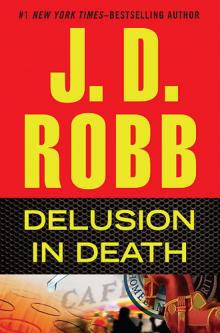 Delusion in Death edahr-44
Delusion in Death edahr-44 Missing in Death edahr-36
Missing in Death edahr-36 Origin in Death edahr-24
Origin in Death edahr-24![[In Death 18] - Divided in Death Read online](http://i1.bookreadfree.com/i1/04/03/in_death_18_-_divided_in_death_preview.jpg) [In Death 18] - Divided in Death
[In Death 18] - Divided in Death The Lost
The Lost![[In Death 05] - Ceremony in Death Read online](http://i1.bookreadfree.com/i1/04/01/in_death_05_-_ceremony_in_death_preview.jpg) [In Death 05] - Ceremony in Death
[In Death 05] - Ceremony in Death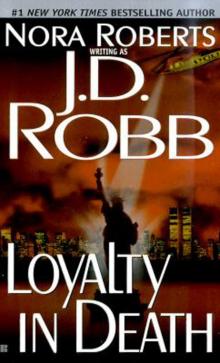 In Death 09 - Loyalty in Death
In Death 09 - Loyalty in Death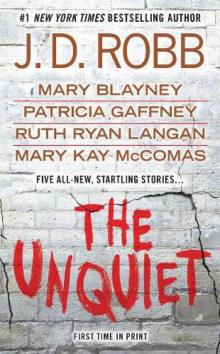 Chaos in Death edahr-42
Chaos in Death edahr-42 In Death 12.5 - Interlude in Death
In Death 12.5 - Interlude in Death![In Death [47] Leverage in Death Read online](http://i1.bookreadfree.com/i1/04/01/in_death_47_leverage_in_death_preview.jpg) In Death [47] Leverage in Death
In Death [47] Leverage in Death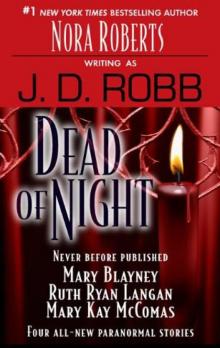 In Death - 24.50 - Dead of Night
In Death - 24.50 - Dead of Night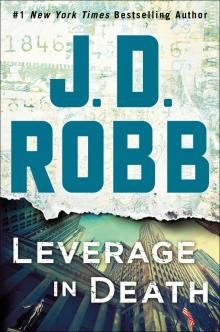 Leverage in Death--An Eve Dallas Novel
Leverage in Death--An Eve Dallas Novel![[In Death 24] - Innocent in Death Read online](http://i1.bookreadfree.com/i1/04/05/in_death_24_-_innocent_in_death_preview.jpg) [In Death 24] - Innocent in Death
[In Death 24] - Innocent in Death![[In Death 15] - Purity in Death Read online](http://i1.bookreadfree.com/i1/04/05/in_death_15_-_purity_in_death_preview.jpg) [In Death 15] - Purity in Death
[In Death 15] - Purity in Death The In Death Collection, Books 26-29
The In Death Collection, Books 26-29 New York to Dallas edahr-41
New York to Dallas edahr-41 The Other Side
The Other Side The In Death Collection 06-10
The In Death Collection 06-10![[In Death 08] - Conspiracy in Death Read online](http://i1.bookreadfree.com/i2/04/05/in_death_08_-_conspiracy_in_death_preview.jpg) [In Death 08] - Conspiracy in Death
[In Death 08] - Conspiracy in Death The In Death Collection, Books 21-25
The In Death Collection, Books 21-25 Memory in Death edahr-25
Memory in Death edahr-25 The In Death Collection, Books 30-32
The In Death Collection, Books 30-32 Down the Rabbit Hole
Down the Rabbit Hole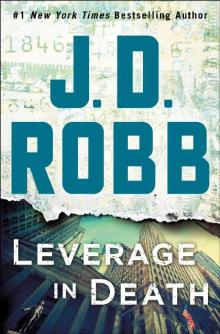 Leverage in Death: An Eve Dallas Novel (In Death, Book 47)
Leverage in Death: An Eve Dallas Novel (In Death, Book 47) The In Death Collection, Books 6-10
The In Death Collection, Books 6-10 The In Death Collection, Books 11-15
The In Death Collection, Books 11-15 Celebrity in Death edahr-43
Celebrity in Death edahr-43 Treachery in Death edahr-40
Treachery in Death edahr-40![[In Death 12] - Betrayal in Death Read online](http://i1.bookreadfree.com/i2/04/13/in_death_12_-_betrayal_in_death_preview.jpg) [In Death 12] - Betrayal in Death
[In Death 12] - Betrayal in Death The In Death Collection, Books 1-5
The In Death Collection, Books 1-5